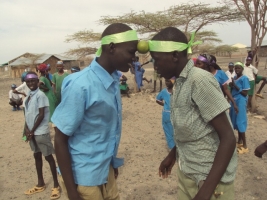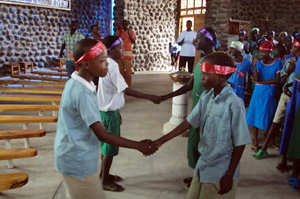
At a Peace Camp in northern Kenya, children from rival tribes play teambuilding games.
Credits: Diocese of Marsabit
“Three years ago, this was a battlefield.” Godfrey Godana, who works on peace programmes for Caritas, is speaking about a newly-dug shallow well in northern Kenya. The people in this region—from tribes like the Borana, Rendille, and Gabra—were desperate for water during a long drought that turned their land brown in mid-2011. They were so desperate that they were willing to work with their age-old enemies.
“We told warring communities, you can dig a common water source and share the water,” says Gabriel Gambare, another Caritas staffer. “We talked to Borana, Rendille, and Turkana tribes, telling them they would dig the dam and get cash for their work.”
It was a gamble. But with livestock dying and crops shrivelled, villagers knew they couldn’t let their differences keep them from getting water.
“In the past, there were no opportunities for them to interact,” says Gambare. The ethnic groups would steal each other’s cattle or fight over pasture in a nearby game reserve. “There’s a battle for supremacy,” Gambare continues. “In 2005, there was a massacre and about 80 people were killed.” House-burnings are common. “The traditional homes have thatched roofs, so even if you just light them with a match, they burn quickly.”
Highway killings–where the shooter is on a hill above a main road—also happen frequently. “The victims are often innocent people who have nothing to do with the conflict,” says Godana. “Mothers go to the forest to gather wood that they plan to sell for their children’s school fees. On the road back they are shot.
“People are killed to make their community feel pain.”
In an atmosphere made even more tense by the drought, Caritas staff in the diocese of Marsabit shuttled between the communities, planning the well project. “We do a build up to the project—football matches, elders’ meetings” to get the communities used to interacting, says Godana.
Soon work began.“Fifty Borana and fifty Rendille worked on the well for two weeks, de-silting,” says Godana. He was surprised by what came next. “When they finished, they celebrated together,” he smiles.
Watching out for weapons
Throughout the world, Caritas runs similar joint projects to help improve relations between opposing groups and reduce violence. But in northern Kenya, the diocese’s Justice and Peace staffers knew they had to do more.
A big part of the problem was guns. Because it’s difficult to provide protection to nomadic herders who travel long distances with their flocks, Kenya’s government gives guns to local men. These men, known as the Kenyan Police Reserve (KPR), are supposed to travel with herders and prevent cattle stealing. “They look for young men who are responsible—the elders vet them to make sure they will use the gun well,” says Godana. But the ‘hired gun’ phenomenon was a concern. “KPR guys are not paid. If you have a gun, you’re not going to want to sleep hungry, “ continues Godana. “KPR people should be trained and motivated, but that’s not happening.” Ballistics investigations indicate that many killings in the Marsabit region are done by KPR guns.
The diocese decided to hold a monthly meeting with KPR men, keeping a list of who has the guns. When the men came with their guns to a meeting in a pastoral centre’s dining hall, “there was a lot of tension” Godfrey smiles. “These are men who are normally killing each other.”
Caritas staff work with the young men, encouraging them to use their weapons only to defend the people they serve, and not for other reasons. “We lobby the government to pay the KPR,” says Godana, so they have a legitimate source of income. “And we bought ten mobile phones so the KPR men can contact each other.”
The interventions have helped. “Compared to past years, things are calmer since we started engaging the KPR,” says Godana.
Caritas also organizes peace meetings among rival communities. “At the meetings, people play the blame game,” says Godana. “They say to the other group: ‘You raided us, you killed our people.’ We say, ‘OK, what’s the way forward?’”
‘You will be killing my friend’s parents’
One way forward is to focus on young people. “The children are brought up to see the other community as the enemy,” says Godana. “They grow up with that mentality.”
In the Marsabit area, Caritas organises children’s peace camps for kids aged 10 to 13—three days of games, singing, and teamwork exercises. Between the sack races and balloon games, children share experiences and learn to appreciate the cultures of other ethnic groups. “At the camp, the Rendille kids said the children of the Borana are very nice,” says Gambare.
“We say to the children, ‘You are the future leaders,’” continues Gambare. “We tell them to tell their parents, ‘If you raid these cattle, my friends will not have milk.’ Or ‘You will be killing my friend’s parents.’”
Caritas leaders have seen changes once the camps end. “Afterwards, children write letters to each other, visit each other’s homes,” says Godana. “One Gabra mother said, ‘My daughter is even singing Rendille songs,’” he adds.
“Now, we hear of host children taking their new friends to their homes and saying, ‘Mom, could we have tea?’” says Gambare. “When a child says that to you, you don’t resist.”
Teaching peace by example

With games like this one, children share experiences and learn to appreciate the cultures of other ethnic groups.
Credit:Diocese of Marsabit
Caritas also works in schools to increase understanding between rival groups. A “Peace Ambassadors” programme brings young teacher from one tribe to teach in public schools where the students are from a different tribe. “The government of Kenya doesn’t have enough teachers, so schools and parents are grateful,” says Gambare. “So, for example, we bring a Borana volunteer to a Rendille school.”
Eighteen-year-old Samuel Wario of Hula Hula primary school is one of the teachers. “The children were surprised when I came here. They said ‘How can a Borana teach us?’”
Wario and his family have suffered from tribal conflicts. “Last year one of my brothers was killed in a cattle rustling incident,” he says. “The Rendille community is the one that killed my brother.”
But Wario is breaking the cycle of revenge that plagues his region. “There are traumas are in both communities,” he says. “I want to bring peace to my community.”
So Wario began teaching at the rural school. “At first I was a little frightened, but with time I interacted with them,” he says. He’s popular with his students, who crowd around him as he talks about the Peace Ambassadors programme. “I like Samuel,” says seven-year-old Herkin. An older boy adds, “He teaches us well. I was happy when he came here, because he’s educated.”
The programme reduces conflict while improving children’s education in remote villages. “Many communities are requesting more peace ambassadors,” says Gambare.
Funded by Caritas members like CAFOD (a Caritas member based in the UK), Cordaid (Caritas Netherlands), and others, the peacebuilding camps, water projects, and other programmes are saving lives in areas torn by violence. “We open up communities and help them embrace each other,” says Gambare.
If children make friends with former enemies, the next generation might be spared the pain their parents faced. “Caritas has given us this possibility,” says Wario. “We want a great peace.”
By Laura Sheahen – Laura Sheahen is a Communications Officer for Caritas Internationalis.
